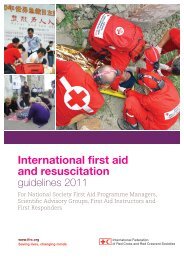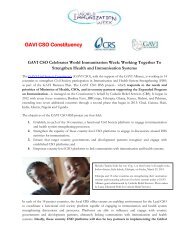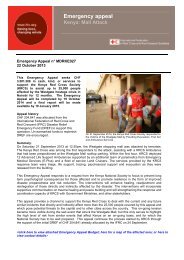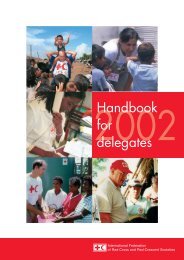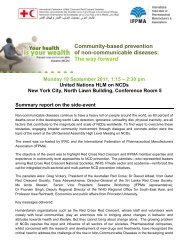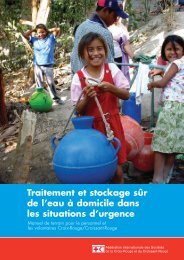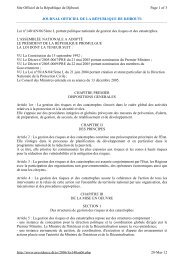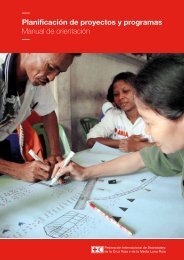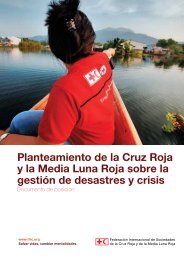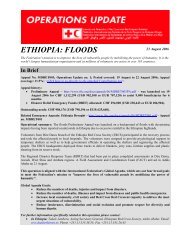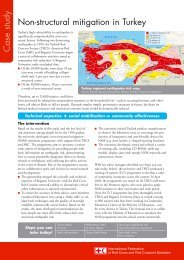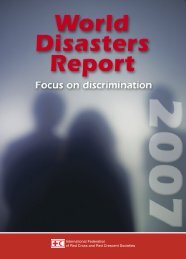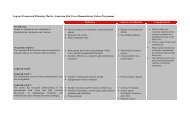Through albino eyes - International Federation of Red Cross and ...
Through albino eyes - International Federation of Red Cross and ...
Through albino eyes - International Federation of Red Cross and ...
Create successful ePaper yourself
Turn your PDF publications into a flip-book with our unique Google optimized e-Paper software.
<strong>Through</strong> <strong>albino</strong> <strong>eyes</strong><br />
The plight <strong>of</strong> <strong>albino</strong> people in Africa’s<br />
Great Lakes region <strong>and</strong> a <strong>Red</strong> <strong>Cross</strong> response<br />
Advocacy report
Cover photo: 11-year-old Tahia heard about <strong>albino</strong> murders on the radio<br />
<strong>and</strong> now stays inside her Tanzanian boarding school at all times. She says<br />
she asks her non-<strong>albino</strong> friends to play in the shade so she can join them.<br />
(Photo: Dieter Telemans/Panos)<br />
© <strong>International</strong> <strong>Federation</strong> <strong>of</strong> <strong>Red</strong> <strong>Cross</strong> <strong>and</strong> <strong>Red</strong> Crescent Societies<br />
Any part <strong>of</strong> this h<strong>and</strong>book may be cited, copied, translated into other<br />
languages or adapted to meet local needs without prior permission from<br />
the <strong>International</strong> <strong>Federation</strong> <strong>of</strong> <strong>Red</strong> <strong>Cross</strong> <strong>and</strong> <strong>Red</strong> Crescent Societies,<br />
provided that the source is clearly stated. The maps used do not imply<br />
the expression <strong>of</strong> any opinion on the part <strong>of</strong> the <strong>International</strong> <strong>Federation</strong> <strong>of</strong><br />
<strong>Red</strong> <strong>Cross</strong> <strong>and</strong> <strong>Red</strong> Crescent Societies or National Societies concerning<br />
the legal status <strong>of</strong> a territory or <strong>of</strong> its authorities.<br />
2009 – <strong>International</strong> <strong>Federation</strong> <strong>of</strong> <strong>Red</strong> <strong>Cross</strong> <strong>and</strong><br />
<strong>Red</strong> Crescent Societies<br />
P.O. Box 372<br />
CH-1211 Geneva 19<br />
Switzerl<strong>and</strong><br />
Telephone: +41 22 730 4222<br />
Telefax: +41 22 733 0395<br />
E-mail: secretariat@ifrc.org<br />
Web site: www.ifrc.org
Foreword<br />
Authors’ note<br />
The authors <strong>of</strong> this report<br />
would like to express<br />
their gratitude to all those,<br />
particularly in the Burundi<br />
<strong>and</strong> Tanzania <strong>Red</strong> <strong>Cross</strong><br />
societies, who gave time<br />
<strong>and</strong> effort to make it<br />
possible. It aims to chronicle<br />
the plight <strong>of</strong> people living<br />
with albinism in the Great<br />
Lakes region <strong>and</strong> to scope<br />
the possibilities for an<br />
exp<strong>and</strong>ed humanitarian<br />
response. It is not an<br />
attempt to investigate<br />
the recent killings, nor<br />
an evaluation <strong>of</strong> the way<br />
governments have reacted.<br />
It is dedicated to the African<br />
<strong>Red</strong> <strong>Cross</strong> volunteers <strong>and</strong><br />
journalists who brought<br />
this story to the world’s<br />
attention.<br />
Andrei Engstr<strong>and</strong>-Neacsu<br />
<strong>and</strong> Alex Wynter<br />
The experience <strong>of</strong> <strong>albino</strong>s in the<br />
Great Lakes region stirs some <strong>of</strong><br />
Africa’s worst memories, not to<br />
mention the stereotypes sometimes<br />
propagated outside the continent.<br />
Yet this report, based on detailed field<br />
research in Tanzania <strong>and</strong> Burundi,<br />
shows that many ordinary villagers in<br />
remote areas have done their best to<br />
protect people among them who live<br />
with albinism <strong>and</strong> who are also their<br />
husb<strong>and</strong>s, wives, parents or, most <strong>of</strong>ten,<br />
their children.<br />
The world might not have heard <strong>of</strong> this<br />
story at all were it not for the extraordinary<br />
courage <strong>of</strong> one Tanzanian<br />
journalist, Vicky Ntetema, now the<br />
BBC’s Dar es Salaam bureau chief,<br />
who risked her life to bring it to light.<br />
And we have probably all been set an<br />
example by the <strong>Red</strong> <strong>Cross</strong> volunteers<br />
who, in 2008 after the first killings near<br />
Kigoma in north-west Tanzania, gave<br />
up some <strong>of</strong> their modest per diems to<br />
pay for basic items for the <strong>albino</strong><br />
children <strong>and</strong> youngsters who had<br />
taken refuge in a local school for the<br />
disabled.<br />
The murders have also dramatically<br />
highlighted something that, in terms <strong>of</strong><br />
life lost, is probably a worse crisis: the<br />
skin cancer that kills many young<br />
<strong>albino</strong>s in tropical Africa. No one knows<br />
exactly how high they are, but it is<br />
certain that skin-cancer rates among<br />
<strong>albino</strong>s in the countryside are much<br />
higher than they need be for want <strong>of</strong><br />
simple, cheap protective measures<br />
<strong>and</strong> health education.<br />
This is where <strong>Red</strong> <strong>Cross</strong> societies <strong>and</strong><br />
other community-based groups will<br />
continue to play a key role. It is our<br />
hope that their central role in promoting<br />
a culture <strong>of</strong> non-violence <strong>and</strong> fighting<br />
discrimination will be better recognized<br />
<strong>and</strong> supported by authorities <strong>and</strong><br />
partners alike.<br />
We hope that by issuing this report in<br />
Nairobi, on the occasion <strong>of</strong> the General<br />
Assembly <strong>of</strong> the <strong>International</strong> <strong>Federation</strong><br />
<strong>of</strong> <strong>Red</strong> <strong>Cross</strong> <strong>and</strong> <strong>Red</strong> Crescent<br />
Societies, which is being held in Africa<br />
for the first time, we may be able to<br />
help keep the spotlight on this “silent<br />
emergency”.<br />
It has only just begun to be addressed.<br />
Bekele Geleta Salif Keita
Albinism in<br />
the Great Lakes<br />
Advocacy highlights<br />
Worldwide the <strong>International</strong> <strong>Federation</strong> is committed to engaging<br />
with its member National Societies to promote a culture <strong>of</strong> nonviolence<br />
<strong>and</strong> fight discrimination wherever it arises. In the Great<br />
Lakes region <strong>of</strong> Africa, the <strong>Federation</strong> sees the immediate<br />
priorities for humanitarian advocacy as these:<br />
Governments must…<br />
• Ensure effective legal protection for people with albinism.<br />
• Use local administrative structures to locate <strong>and</strong> protect <strong>albino</strong><br />
people in hiding.<br />
• Conduct public anti-discrimination campaigns <strong>and</strong> extend<br />
medical services to <strong>albino</strong>s in need.<br />
<strong>Red</strong> <strong>Cross</strong> <strong>Red</strong> Crescent National Societies need support to…<br />
• Partner with government agencies to eliminate discrimination<br />
against people with albinism.<br />
• Provide health education for the prevention <strong>of</strong> skin cancer.<br />
• Provide psycho-social support <strong>and</strong> vocational training.<br />
The <strong>International</strong> <strong>Federation</strong> will…<br />
• Provide technical support to National Societies already working<br />
with <strong>albino</strong>s in distress or in hiding.<br />
• Assist the safe reintegration <strong>of</strong> <strong>albino</strong>s into society.<br />
• Mobilize international support for the long-term alleviation <strong>of</strong> the<br />
plight <strong>of</strong> <strong>albino</strong>s in the Great Lakes region <strong>of</strong> Africa.<br />
4<br />
A <strong>Red</strong> <strong>Cross</strong> volunteer takes<br />
an <strong>albino</strong> child to a picnic at<br />
the Kabanga school. (IFRC)<br />
<strong>International</strong> <strong>Federation</strong> <strong>of</strong> <strong>Red</strong> <strong>Cross</strong> <strong>and</strong> <strong>Red</strong> Crescent Societies
Introduction<br />
The occult-based killings <strong>of</strong> <strong>albino</strong>s in eastern parts <strong>of</strong> Burundi <strong>and</strong> several<br />
regions <strong>of</strong> north-west Tanzania – the general area between Lake Tanganyika<br />
<strong>and</strong> Lake Victoria – were first brought to light by journalists, initially from<br />
Africa then from the global news media. In October 2009, at a ceremony in<br />
Stockholm, the Tanzanian journalist Richard Mgamba was awarded the<br />
Lorenzo Natali Journalism Prize for Africa for his coverage <strong>of</strong> the Great Lakes<br />
<strong>albino</strong> emergency.<br />
Perhaps most famously, the outside world’s attention was drawn to the<br />
<strong>albino</strong>s’ plight by the undercover reports, produced at great risk to her life, by<br />
the BBC’s Dar es Salaam bureau chief, Vicky Ntetema, herself a Tanzanian.<br />
(See box: The reporter’s story.) Most recently, at the time <strong>of</strong> writing, the story<br />
was featured by the US ABC network in its 20/20 programme.<br />
As this report was being drafted, a three-month lull in the <strong>albino</strong> killings<br />
in Tanzania came to an end with a brutal attack on a family in the Geita district<br />
<strong>of</strong> Mwanza region. A 10-year-old <strong>albino</strong> boy, Gasper Elikana, was killed<br />
on 21 October by hunters who fled with his leg, which they hacked <strong>of</strong>f in front<br />
<strong>of</strong> his family having first beheaded him to stop him screaming. His neighbours<br />
<strong>and</strong> his black father, who was left fighting for his life in hospital, had tried<br />
bravely but unsuccessfully to protect him.<br />
The last reported killing <strong>of</strong> an <strong>albino</strong> had been on 18 July, <strong>and</strong> the whole<br />
<strong>of</strong> Tanzania had hoped that the firm action taken – including the sentences<br />
passed on three <strong>albino</strong> hunters from the Shinyanga region convicted <strong>of</strong> the<br />
murder <strong>of</strong> 13-year-old <strong>albino</strong> schoolboy Matatizo Dunia – had finally put an<br />
end to the killings. The news <strong>of</strong> Gasper’s murder caused dismay nationwide.<br />
The <strong>of</strong>ficial death toll now st<strong>and</strong>s at 44 <strong>albino</strong>s killed in Tanzania <strong>and</strong> 12<br />
in the eastern Burundian provinces <strong>of</strong> Cankuzo, Kirundo, Muyinga <strong>and</strong><br />
Ruyigi – on or near the border with Tanzania. This figure for Tanzania is the<br />
Thous<strong>and</strong>s <strong>of</strong> <strong>albino</strong>s are<br />
no longer able to move around<br />
for fear <strong>of</strong> the hunters<br />
one given by police to the special parliamentary committee investigating the<br />
killings. Private organizations <strong>and</strong> some media in Tanzania have put the<br />
number higher, at more than 50 deaths.<br />
Burundians – no less shocked by the killings than their Tanzanian neighbours<br />
– believe the market for <strong>albino</strong> body parts exists mainly if not exclusively<br />
in Tanzania, generated by big-money buyers who use them as talismans<br />
to bring luck <strong>and</strong> above all wealth. Senior police <strong>of</strong>ficers in Dar es Salaam said<br />
a complete set <strong>of</strong> <strong>albino</strong> body parts – including all four limbs, genitals, ears,<br />
tongue <strong>and</strong> nose – was fetching the equivalent <strong>of</strong> 75,000 US dollars.<br />
<strong>Through</strong> <strong>albino</strong> <strong>eyes</strong> / The plight <strong>of</strong> <strong>albino</strong> people in Africa’s Great Lakes region <strong>and</strong> a <strong>Red</strong> <strong>Cross</strong> response 5
Democratic<br />
Republic<br />
<strong>of</strong> Congo<br />
Jane Chagie <strong>of</strong> the Tanzania <strong>Red</strong> <strong>Cross</strong><br />
is a leading light in the effort to save the<br />
<strong>albino</strong>s. (IFRC)<br />
Butare<br />
Lake<br />
Tanganyika<br />
Rw<strong>and</strong>a<br />
6<br />
Burundi<br />
Bujumbura<br />
Kigoma<br />
Kigali<br />
Ruyigi<br />
Lake Albert<br />
Kigoma<br />
Ug<strong>and</strong>a<br />
Kagera<br />
1. Data in this report is current as <strong>of</strong> late October 2009.<br />
Mwanza<br />
Kampala<br />
Lake<br />
Victoria<br />
Tanzania<br />
Mwanza<br />
Shinyanga<br />
Kenya<br />
After they began in 2007, the<br />
killings quickly triggered a smallscale<br />
humanitarian crisis in both<br />
countries, leaving as many as 300<br />
young <strong>albino</strong>s ab<strong>and</strong>oned or str<strong>and</strong>ed<br />
in existing Tanzanian schools for<br />
the disabled like the Kabanga school<br />
(49 <strong>albino</strong>s) at Kasulu, Kigoma<br />
region, <strong>and</strong> the Mitindo school (103<br />
<strong>albino</strong>s) at Misungwi, Mwanza<br />
region – a centre <strong>of</strong> the killings <strong>and</strong><br />
the witchcraft practices behind them<br />
– <strong>and</strong> in emergency shelters in<br />
Burundi where many remain well<br />
after the last killing there on 14<br />
March. 1<br />
In Burundi – a tiny country relative<br />
to Tanzania which has a l<strong>and</strong><br />
mass nearly equal to that <strong>of</strong> France<br />
<strong>and</strong> Germany together – the police<br />
were able to gather <strong>albino</strong>s in secure<br />
urban locations <strong>and</strong> mount a 24hour<br />
guard on them. That guard has<br />
yet to be stood down.<br />
An undetermined number <strong>of</strong><br />
Tanzanian <strong>albino</strong>s also reportedly<br />
clustered near police stations <strong>and</strong><br />
churches or are, in the words <strong>of</strong> one<br />
<strong>Red</strong> <strong>Cross</strong> worker, “just hiding in<br />
their backyards”. It is impossible even<br />
to estimate the number <strong>of</strong> <strong>albino</strong>s<br />
who have been displaced. What is<br />
certain is that thous<strong>and</strong>s – probably<br />
the overwhelming majority <strong>of</strong> the<br />
total population <strong>of</strong> <strong>albino</strong>s, whatever<br />
it may be – are no longer able to move<br />
around freely to work, study or tend<br />
vegetable plots for fear <strong>of</strong> the hunters.<br />
In effect, their lives are on hold.<br />
As <strong>of</strong> mid-September 2009, terrified<br />
<strong>albino</strong> children were continuing<br />
to arrive at the Kabanga school. The<br />
most recent arrival, seven-year-old<br />
Enus Abel, spent two weeks hiding in<br />
the bush with his black mother after<br />
hunters appeared in their village.<br />
They finally made it to Kabanga <strong>and</strong><br />
safety on 13 September.<br />
<strong>International</strong> <strong>Federation</strong> <strong>of</strong> <strong>Red</strong> <strong>Cross</strong> <strong>and</strong> <strong>Red</strong> Crescent Societies
The cancer patient’s story<br />
EVODE MAPUNDA<br />
Dar es Salaam<br />
“He’s been saying his goodbyes”<br />
Until recently, Happy Mapunda would have considered herself aptly named.<br />
She lived with her <strong>albino</strong> husb<strong>and</strong>, Evode, 34, in the small town <strong>of</strong> Songea,<br />
in the far south <strong>of</strong> Tanzania, where he worked as a primary school teacher –<br />
a common occupation for many <strong>albino</strong>s who manage, against the odds, to<br />
acquire an education.<br />
Happy, 30, who is black, says her husb<strong>and</strong> used to be a h<strong>and</strong>some man.<br />
Their marriage was blessed with five children, including two sets <strong>of</strong> twins, all<br />
<strong>of</strong> them black.<br />
Now, he is lying in a ward <strong>of</strong> the national cancer hospital in Dar es Salaam,<br />
where he arrived in a critical condition after a 12-hour ambulance drive.<br />
Fighting back tears but speaking in tribute to her much-loved husb<strong>and</strong>, Happy<br />
explains that he has now had eight out <strong>of</strong> a planned ten radiotherapy sessions,<br />
but she is not sure he’ll be able to finish the course.<br />
“For the last three days he hasn’t been<br />
able to eat or speak,” she says. Food<br />
<strong>and</strong> fluids just seep out <strong>of</strong> the hole in<br />
his neck made by skin cancer.<br />
Evode, even though he is near the<br />
end, still bears an unmistakeably<br />
refined, schoolmasterly air. “He’s been<br />
saying his goodbyes,” says Happy.<br />
“Just saying ‘goodbye, goodbye. Take<br />
care <strong>of</strong> the kids, say goodbye to my<br />
parents <strong>and</strong> my priest’.<br />
“I don’t know how I’m going to manage<br />
with our children. Evode’s parents are<br />
very old themselves.”<br />
Happy, who works a small plot near<br />
their home, recalls that when stories about the killings <strong>of</strong> <strong>albino</strong>s near the<br />
Great Lakes started to appear in their newspapers, Evode “felt threatened”<br />
<strong>and</strong> wondered aloud if they would spread south. But there were no <strong>albino</strong><br />
murders in Songea, she says.<br />
In <strong>albino</strong> terms, he had been one <strong>of</strong> the lucky ones, with a job indoors, out <strong>of</strong><br />
the sun. It was not enough.<br />
Postscript: Evode Mapunda completed his course <strong>of</strong> radiotherapy but was<br />
discharged from Ocean Road on 12 October 2009 for terminal care in Songea.<br />
<strong>Through</strong> <strong>albino</strong> <strong>eyes</strong> / The plight <strong>of</strong> <strong>albino</strong> people in Africa’s Great Lakes region <strong>and</strong> a <strong>Red</strong> <strong>Cross</strong> response 7
‘Noirs à la peau blanche’ 2<br />
2. “En Afrique, il existe une sorte d’apartheid à rebours,<br />
larvée mais pernicieuse, dont sont victimes les <strong>albino</strong>s,<br />
ces ‘Noirs à la peau blanche’ [blacks with white skin].”<br />
(J. D. Mihamile et H. Yonkey)<br />
8<br />
Albinism is technically a hereditary disability; African <strong>albino</strong>s are no different<br />
to any others in the world, though more conspicuous <strong>and</strong> they are acutely<br />
vulnerable to harsh tropical sunlight because <strong>of</strong> their lack (<strong>of</strong>ten total) <strong>of</strong> melanin<br />
skin-pigment. Inadequate melanin in the eye also results in poor vision,<br />
sometimes close to actual blindness, <strong>and</strong> exacerbates their vulnerability still<br />
further.<br />
On the surface, it is difficult to cast the story <strong>of</strong> the occult-based killing <strong>of</strong><br />
<strong>albino</strong>s in the Great Lakes region as anything but negative. It is capable <strong>of</strong><br />
being sensationalized by the western media <strong>and</strong> has been. African <strong>albino</strong>s have<br />
been incorrectly described in western newspaper headlines as “white” <strong>and</strong> as a<br />
“tribe”, albeit above sympathetic articles.<br />
Yet it was African journalists who broke this story <strong>and</strong> covered it diligently<br />
month after month; African specialists, like consultant oncologist Dr Jeff<br />
Lu<strong>and</strong>e, who are now tackling head-on the acute <strong>and</strong> <strong>of</strong>ten lethal health problems<br />
facing <strong>albino</strong>s (see box: The doctor’s story); <strong>and</strong> African National Society<br />
“Albinos want to stay<br />
in the sun like ordinary people”<br />
personnel in both Burundi <strong>and</strong> Tanzania who, from a sense <strong>of</strong> moral duty,<br />
coordinated the spontaneous humanitarian response to the <strong>albino</strong> emergency<br />
using their own resources <strong>and</strong> experience, <strong>and</strong> sometimes money from their<br />
own pockets. The international humanitarian community <strong>and</strong> media are following<br />
their lead.<br />
“Albinism <strong>and</strong> the problems linked to it make this group very vulnerable,<br />
<strong>and</strong> the <strong>Red</strong> <strong>Cross</strong> addresses all vulnerabilities,” says Peter Mlebusi, Deputy<br />
Secretary General <strong>of</strong> the Tanzania <strong>Red</strong> <strong>Cross</strong> National Society. “So <strong>albino</strong>s are<br />
‘clients’ <strong>and</strong> in the future we see it as an area in which we should exp<strong>and</strong>.”<br />
Even before the killings began, <strong>albino</strong>s were a hidden, marginalized population,<br />
the victims or ignorance <strong>and</strong> discrimination whose precise number <strong>and</strong><br />
location was (<strong>and</strong> still is) a mystery.<br />
In Burundi, to an even greater extent than in Tanzania, the true number <strong>of</strong><br />
<strong>albino</strong>s is unknown. The lack <strong>of</strong> proper census data is almost total: “We know<br />
so little,” says Kazungu Kassim, Director <strong>of</strong> Albinos Sans Frontières Burundi<br />
(ASF), <strong>and</strong> himself an <strong>albino</strong>. The best estimate anyone can give – <strong>and</strong> the one<br />
used operationally by the Burundi <strong>Red</strong> <strong>Cross</strong> – is that there are at least 1,000<br />
<strong>albino</strong>s countrywide.<br />
The number <strong>of</strong> <strong>of</strong>ficially registered <strong>albino</strong>s in Tanzania is 6,977, according<br />
to Al-Shaymaa Kwegyir, the country’s first <strong>albino</strong> Member <strong>of</strong> Parliament<br />
whom President Jakaya Mrisho Kikwete appointed (as the MP puts it herself)<br />
to “express solidarity with the <strong>albino</strong> community”. Again, some groups <strong>and</strong><br />
media have put the number much higher than this, <strong>and</strong> it should be noted that<br />
<strong>International</strong> <strong>Federation</strong> <strong>of</strong> <strong>Red</strong> <strong>Cross</strong> <strong>and</strong> <strong>Red</strong> Crescent Societies
A teenage <strong>albino</strong> girl practises typing at<br />
the Mitindo school. (IFRC)<br />
this total includes only people who come forward voluntarily to register. Now,<br />
after the killing spree, this most conspicuous group are doing everything they<br />
possibly can to make themselves inconspicuous.<br />
Of one idea – that because <strong>of</strong> some environmental or genetic quirk there is<br />
a disproportionate number <strong>of</strong> <strong>albino</strong>s in Tanzania – Dr Lu<strong>and</strong>e is happy to<br />
dispose. “That’s a myth,” he says.<br />
The overwhelming majority <strong>of</strong> <strong>albino</strong>s who are in paid employment (a<br />
small proportion <strong>of</strong> the total) find work outdoors in the sun – the very last<br />
place they should be. This involves activities like roadside trading, market<br />
stalls, agricultural day-labour <strong>and</strong> the like. Those who aren’t in paid employment<br />
survive by tending small plots – again out in the sun.<br />
This acute dilemma has been multiplied many times over by the killings.<br />
Twenty-six-year-old <strong>albino</strong> Yusuf Elias says it’s really very simple: “If you<br />
don’t go in the sun you don’t eat,” adding that for security reasons he has now<br />
been barred by elders from tending his plot a short distance away from his<br />
village near Mwanza where there was a particularly notorious murder <strong>and</strong> dismemberment<br />
<strong>of</strong> a young girl by <strong>albino</strong> hunters. Yusuf survives on the charity<br />
<strong>of</strong> his neighbours. (See box: The villager’s story.)<br />
That the parents <strong>of</strong> many <strong>albino</strong>s are themselves black inevitably increases<br />
the likelihood that their desperately acute sensitivity to harsh equatorial sunlight<br />
will go unrecognized as they grow up in remote rural areas – usually<br />
developing, by a very young age, a facial rash <strong>of</strong> dark melanomas that are the<br />
precursor <strong>of</strong> the skin cancer that kills so many <strong>albino</strong>s in early adulthood.<br />
If the battle for what in the North is called “sun safety” has only recently<br />
been won there, in sub-Saharan Africa the concept does not exist, as the testimony<br />
<strong>of</strong> Alfrede Kapole, the chairman <strong>of</strong> the Mwanza branch <strong>of</strong> Tanzania’s<br />
Albino Association makes clear: “We have tried to motivate people to go early<br />
in the morning [to cultivate] <strong>and</strong> come back before the sun gets high.<br />
“But they [<strong>albino</strong>s] want to stay in the sun like ordinary people who work<br />
in the midday sun. So you find that because people don’t know, they will burn.<br />
And our parents just leave us like that.<br />
“When we complain, we’ll just be told to ‘get used to it’.”<br />
<strong>Through</strong> <strong>albino</strong> <strong>eyes</strong> / The plight <strong>of</strong> <strong>albino</strong> people in Africa’s Great Lakes region <strong>and</strong> a <strong>Red</strong> <strong>Cross</strong> response 9
The mother’s story<br />
MARIE NIYUKURI<br />
Ruyigi, Burundi<br />
“People round here are on<br />
the alert now”<br />
10<br />
The suspected <strong>albino</strong>-hunter who rode his bike straight at Marie Niyukuri’s eightyear-old<br />
<strong>albino</strong> son was lucky: he was saved by the police from being lynched<br />
on the spot by her vigilant neighbours, who were jumpy since a small <strong>albino</strong> boy<br />
had been snatched <strong>and</strong> killed in the next colline (hill or administrative unit).<br />
It seems the man had clumsily attempted<br />
to fake a road accident <strong>and</strong> make <strong>of</strong>f with<br />
Ephreim’s body, but the boy was pulled<br />
back by his non-<strong>albino</strong> friends. Police forced<br />
the attacker to pay for medical attention for<br />
Ephreim before taking the man to jail.<br />
Marie’s confidence in her neighbours seems,<br />
if anything, to have grown since <strong>albino</strong>s<br />
began being killed in August 2008. She,<br />
her husb<strong>and</strong> Protais, Ephreim’s 14-year-old<br />
<strong>albino</strong> sister Faustine, <strong>and</strong> their eight black<br />
siblings live on a cultivated hillside near the<br />
eastern town <strong>of</strong> Ruyigi.<br />
The children walk three kilometres every day,<br />
unescorted, to school.<br />
The family briefly took refuge in a shelter in<br />
town with other <strong>albino</strong>s, but the fact that<br />
“people round here are on the alert now,” Marie explains, is a large part <strong>of</strong> the<br />
reason why they returned.<br />
Marie’s other concerns for her son quickly returned once the immediate threat<br />
to his life passed. (No <strong>albino</strong> has been killed by hunters in Burundi since 14<br />
March.)<br />
“He’s struggling at school,” she says. “He had to repeat his first year three<br />
times.<br />
“While we were in the shelter <strong>and</strong> he was at school in town, the teachers put<br />
him in the front row so he could see. But not here.” This is the easily rectifiable<br />
problem facing many <strong>albino</strong> schoolchildren.<br />
Marie <strong>and</strong> Protais also say their two <strong>albino</strong> children are extremely fussy<br />
eaters – something they associate with the condition – but the family’s diet is<br />
monotonous, even when it’s adequate.<br />
Perhaps most seriously, neither Ephreim nor his sister Faustine, who speaks<br />
in a whisper with her head bowed, has received any medical attention for the<br />
melanomas that liberally speckle their arms <strong>and</strong> faces. And neither child owns<br />
a potentially life-saving, wide-brimmed hat.<br />
“We got married very young,” says Marie. “When I started having <strong>albino</strong><br />
babies [their first <strong>albino</strong> child died in infancy] I was shocked <strong>and</strong> I looked for<br />
an explanation, but I gave up <strong>and</strong> accepted them <strong>and</strong> treated them the same.”<br />
<strong>International</strong> <strong>Federation</strong> <strong>of</strong> <strong>Red</strong> <strong>Cross</strong> <strong>and</strong> <strong>Red</strong> Crescent Societies
A young <strong>albino</strong> boy nurses his sunburnt<br />
h<strong>and</strong>s <strong>and</strong> feet. (IFRC)<br />
Even in the special schools, where children are as well looked after as<br />
human <strong>and</strong> material resources permit, some are so badly sunburnt that they<br />
appear to have been scalded.<br />
Al-Shaymaa points out that in the past the principal threat to the lives <strong>of</strong><br />
<strong>albino</strong>s in the Great Lakes region, apart from skin cancer, was infanticide –<br />
<strong>of</strong>ten as part <strong>of</strong> a conspiracy between father <strong>and</strong> midwife. “Sometimes,” she<br />
says, “women were divorced for giving birth to an <strong>albino</strong>.” According to<br />
Al-Shaymaa, many other superstitions were held: “That a woman had been<br />
impregnated by a white man or laughed at during her pregnancy by an <strong>albino</strong>,<br />
or that <strong>albino</strong>s were the ghosts <strong>of</strong> European colonialists.”<br />
But on one point all concerned in both Burundi <strong>and</strong> Tanzania agree: the<br />
use <strong>of</strong> the body parts <strong>of</strong> murdered <strong>albino</strong>s as good-luck charms suddenly came<br />
from nowhere <strong>and</strong> seems to have been the result <strong>of</strong> a kind <strong>of</strong> marketing exercise<br />
by witch doctors, who are feeling the same economic pinch as everyone<br />
else around the world.<br />
The humanitarian crisis <strong>of</strong> the Great Lakes noirs à la peau blanche is now<br />
essentially fourfold, says Peter Mlebusi. “One, it is a health problem because <strong>of</strong><br />
the skin conditions associated with albinism. Two, we see it as a stigma <strong>and</strong><br />
discrimination problem in the community. And three, there is the insecurity<br />
because <strong>of</strong> the mythology <strong>of</strong> the wealth that can be generated by selling parts<br />
<strong>of</strong> <strong>albino</strong> bodies.”<br />
And fourthly, he adds, “there is a legal issue because <strong>of</strong> the painfully slow<br />
process involved in dealing with the killings.”<br />
<strong>Through</strong> <strong>albino</strong> <strong>eyes</strong> / The plight <strong>of</strong> <strong>albino</strong> people in Africa’s Great Lakes region <strong>and</strong> a <strong>Red</strong> <strong>Cross</strong> response 11
The <strong>Red</strong> <strong>Cross</strong> response<br />
<strong>and</strong> the future<br />
3. Neither the Kabanga nor the Mitindo school has a<br />
proper kitchen. All food for both staff <strong>and</strong> children has to<br />
be cooked on open wood-fires in the yard.<br />
12<br />
In 2008, more than 60 <strong>albino</strong> children were left at the Mitindo school by their<br />
parents in less than three months after the well-publicized killing <strong>and</strong> dismemberment<br />
<strong>of</strong> a seven-year-old local girl, Mariam Emanuel, whose brother<br />
now lives at the school. But the school, which in theory takes children aged 5<br />
to 14, had no choice but to turn away <strong>albino</strong> babies whose parents could not<br />
stay as it simply had no way <strong>of</strong> caring for them.<br />
Hardened <strong>Red</strong> <strong>Cross</strong> volunteers, who have spent years working in refugee<br />
camps, admit they wept when they saw the physical state <strong>of</strong> <strong>albino</strong> children<br />
after they first took refuge in the schools. Conditions at the schools remain –<br />
by any local st<strong>and</strong>ard <strong>and</strong> despite the best efforts <strong>of</strong> everybody involved –<br />
unacceptable.<br />
As every parent knows, children are quite capable <strong>of</strong> frightening themselves<br />
out <strong>of</strong> their wits with their own imaginations. The mental state <strong>of</strong> those <strong>albino</strong><br />
children who are old enough to underst<strong>and</strong> the real reason for their displacement<br />
can only be guessed at.<br />
The response <strong>of</strong> the two National Societies has been entirely unsupported<br />
externally, <strong>and</strong> based on humanitarian sentiment on the part <strong>of</strong> staff <strong>and</strong> volunteers.<br />
Of the two Tanzanian <strong>Red</strong> <strong>Cross</strong> branches closest to the <strong>albino</strong> crisis –<br />
Kigoma <strong>and</strong> Mwanza – it’s the former that, for fortuitous reasons, was best<br />
placed to <strong>of</strong>fer rapid assistance to displaced <strong>and</strong> petrified <strong>albino</strong>s. For a decade,<br />
Kigoma has been the hub <strong>of</strong> a major international <strong>Red</strong> <strong>Cross</strong> operation, supported<br />
initially by the <strong>International</strong> <strong>Federation</strong> <strong>and</strong> now by the American,<br />
The beneficiaries in<br />
this “silent emergency”<br />
must first be found<br />
Japanese <strong>and</strong> Spanish <strong>Red</strong> <strong>Cross</strong>, to maintain refugee camps for Burundians,<br />
Congolese <strong>and</strong> Rw<strong>and</strong>ans. These operations are now winding down <strong>and</strong> the<br />
Tanzanian government hopes to close the two remaining camps soon; the<br />
branch has thus been left with spare capacity.<br />
The Kigoma regional branch headquarters reported that they had managed<br />
to supply Kabanga with scores <strong>of</strong> beds <strong>and</strong> mattresses left over from the<br />
camps programme, as well as kitchen sets valued at 13 million Tanzanian shillings<br />
(10,000 US dollars). Before that, newly arrived <strong>albino</strong> children had been<br />
sleeping on rags on bare concrete, without mosquito nets, toiletries or any<br />
form <strong>of</strong> sun protection, while the school struggled to feed them <strong>and</strong> get them<br />
fit enough to attend classes.<br />
<strong>International</strong> <strong>Federation</strong> <strong>of</strong> <strong>Red</strong> <strong>Cross</strong> <strong>and</strong> <strong>Red</strong> Crescent Societies
The doctor’s story<br />
JEFF LUANDE<br />
Dar es Salaam<br />
“The purpose was to help <strong>albino</strong>s mobilize”<br />
Dr Jeff Lu<strong>and</strong>e wears his erudition very lightly. His book-lined <strong>of</strong>fice at the<br />
national cancer hospital in Dar es Salaam – universally known by its optimisticsounding<br />
address, “Ocean Road” – is crammed with academic papers in<br />
waist-high piles. His manner is easy <strong>and</strong> welcoming, but supremely expert<br />
<strong>and</strong> confident.<br />
Dr Lu<strong>and</strong>e, a consultant oncologist, is Tanzania’s top authority on the grave<br />
humanitarian problem <strong>of</strong> the skin cancer to which so many <strong>of</strong> the country’s<br />
<strong>albino</strong>s succumb.<br />
Since the 1970s, Dr Lu<strong>and</strong>e has dedicated much <strong>of</strong> his<br />
career to studying the health problems afflicting <strong>albino</strong>s.<br />
When they began to be murdered in the north-west <strong>of</strong><br />
Tanzania <strong>and</strong> their body parts sold as talismans, no one<br />
can have been more upset than he was.<br />
“It was a big shock to me,” he says. “Here we are, for the<br />
last 30 years, trying to improve the lot <strong>of</strong> these people <strong>and</strong><br />
have them enjoy life like the rest <strong>of</strong> the general population…”<br />
His voice trails in dismay.<br />
Like so many Tanzanians who have followed the story, he<br />
agrees the occult-based killings seemed to “come from<br />
nowhere”.<br />
It was in 1978 – at the start <strong>of</strong> what must be one <strong>of</strong> the longest-running<br />
programmes <strong>of</strong> its kind in Africa – that Dr Lu<strong>and</strong>e looked at the results <strong>of</strong> the<br />
census held that year <strong>and</strong> concluded that only 2 per cent <strong>of</strong> <strong>albino</strong>s in the<br />
Dar area lived beyond 40. This compared to nearly 15 per cent <strong>of</strong> the general<br />
population.<br />
The original purpose <strong>of</strong> the programme that followed was to “assist <strong>albino</strong>s<br />
to mobilize themselves into a society, help them to have a common voice <strong>and</strong><br />
reach the rest <strong>of</strong> the community,” says Dr Lu<strong>and</strong>e.<br />
“The second aim was to teach them about the problems with their skin, how<br />
to h<strong>and</strong>le them, <strong>and</strong> in case they get skin cancer what services there are.<br />
“Thirdly, we addressed the community at large – teaching them who an <strong>albino</strong><br />
is, how they come about, what problems they have, <strong>and</strong> what the community<br />
can do for them.”<br />
By the 1990s, in Dar es Salaam at least, where medical treatment is available,<br />
things had improved thanks to Dr Lu<strong>and</strong>e’s programme. There is no national<br />
epidemiological data, but all the anecdotal evidence is that in the countryside<br />
<strong>albino</strong> skin-cancer rates are still very high.<br />
<strong>Through</strong> <strong>albino</strong> <strong>eyes</strong> / The plight <strong>of</strong> <strong>albino</strong> people in Africa’s Great Lakes region <strong>and</strong> a <strong>Red</strong> <strong>Cross</strong> response 13
14<br />
Gilbert Nshimirimana <strong>of</strong> the Burundi<br />
<strong>Red</strong> <strong>Cross</strong> talks to displaced <strong>albino</strong>s<br />
under 24-hour police guard. (IFRC)<br />
Most strikingly, in 2008 the Kigoma branch persuaded some 250 individual<br />
local donors – including <strong>of</strong>ficials, businessmen, <strong>Red</strong> <strong>Cross</strong> volunteers living<br />
on field allowances, expatriate delegates <strong>and</strong> UN agency staff – to donate<br />
out <strong>of</strong> their own pockets. In effect, it launched a local appeal, <strong>and</strong><br />
the money raised was used to buy sunblock, blankets, second-h<strong>and</strong> clothes<br />
<strong>and</strong> other items to a total value <strong>of</strong> 5 million Tanzanian shillings (4,000 US<br />
dollars).<br />
The Burundi <strong>Red</strong> <strong>Cross</strong> was also instrumental in coordinating a spontaneous<br />
humanitarian response there, which included local NGOs, UN staff,<br />
churches <strong>and</strong> schools. The <strong>Red</strong> <strong>Cross</strong> branch in Ruyigi province, for example,<br />
where the first <strong>albino</strong> killings in Burundi occurred in August 2008, collected<br />
food, clothes <strong>and</strong> cash that people had donated personally.<br />
The branch in Ruyigi is now scoping a major humanitarian intervention in<br />
the <strong>albino</strong> crisis, which is intended to promote their long-term reintegration<br />
into society <strong>and</strong> reduce the atmosphere <strong>of</strong> vulnerability around them. “We’re<br />
forming a donor partnership with the World Lutheran <strong>Federation</strong>,” says Jean-<br />
Pierre Sinzumunsi, Burundi <strong>Red</strong> <strong>Cross</strong> regional coordinator for Ruyigi <strong>and</strong><br />
Cankuzo provinces. “We want to help our volunteers better underst<strong>and</strong><br />
the problems <strong>of</strong> albinism, <strong>and</strong> to promote the integration <strong>and</strong> protection <strong>of</strong><br />
<strong>albino</strong>s.<br />
“We also aim to sensitize the local authorities, the police, the military,<br />
priests, local NGOs <strong>and</strong> village elders.”<br />
For Jane Chagie, manager <strong>of</strong> the Western Tanzania Refugees Relief<br />
Operation <strong>and</strong> the leading light in the Tanzania <strong>Red</strong> <strong>Cross</strong> National Society’s<br />
effort to save the <strong>albino</strong>s, the humanitarian effort has probably gone as far as<br />
it can with purely local resources: “We have spare capacity here – volunteers<br />
<strong>and</strong> organizational experience, <strong>and</strong> also vehicles <strong>and</strong> <strong>of</strong>fice space – but we need<br />
some external support to run it <strong>and</strong> fuel it.<br />
“Then,” Chagie adds, “the <strong>Red</strong> <strong>Cross</strong> can truly ‘take ownership’ <strong>of</strong> this<br />
desperate humanitarian problem.”<br />
<strong>International</strong> <strong>Federation</strong> <strong>of</strong> <strong>Red</strong> <strong>Cross</strong> <strong>and</strong> <strong>Red</strong> Crescent Societies
The villager’s story<br />
YUSUF ELIAS<br />
Mwanza, Tanzania<br />
“If you don’t go out in the sun you don’t eat”<br />
Again <strong>and</strong> again, Yusuf Elias relives the day in May 2008 when Vumilia Makoye<br />
was murdered, reducing the <strong>albino</strong> population <strong>of</strong> his village on the shore <strong>of</strong><br />
Lake Victoria from four to three.<br />
Vumilia, 21, was the treasurer <strong>of</strong> the local branch <strong>of</strong> the Tanzania Albino<br />
Association, <strong>of</strong> which Yusuf is still the secretary.<br />
Vumilia <strong>and</strong> her family had started eating at around eight in the evening when<br />
Vumilia’s mother saw a flashlight outside their house. “The mother called out<br />
to ask who was there,” says Yusuf, 26. “And some men said, ‘you will know<br />
us’.” It appears one <strong>of</strong> the killers had befriended Vumilia before she left her<br />
work selling peanuts in the market.<br />
“So the mother went to the door <strong>and</strong> they pushed it in. They all struggled, but<br />
they were two strong men <strong>and</strong> inside were only women.<br />
“They overpowered her <strong>and</strong> the door broke. One man pinned her under the<br />
door <strong>and</strong> the other went to Vumilia, cut her throat <strong>and</strong> cut <strong>of</strong>f her right foot.<br />
“They killed her in front <strong>of</strong> her sisters <strong>and</strong> her mother. The one<br />
who killed Vumilia said ‘Hey! I’m done, let’s go’.<br />
“The mother started yelling <strong>and</strong> the neighbours came, but it<br />
was too late. They’d left with the right foot.”<br />
The aftermath <strong>of</strong> this terrifying incident has made survival for<br />
the village’s <strong>albino</strong>s an even tougher challenge than it was<br />
already. The small group used to depend on a vegetable plot<br />
in the bush near the lake shore. But now, the elders have told<br />
them to ab<strong>and</strong>on it because <strong>of</strong> the danger <strong>of</strong> being snatched<br />
by hunters. “The chairman says they can even come for you<br />
during the day,” says Yusuf.<br />
“Now I just do gardening around the house. I start in the morning at daybreak<br />
<strong>and</strong> stop before it gets too dark when I make sure I’m home.”<br />
About the other great killer <strong>of</strong> <strong>albino</strong>s, the sun, Yusuf, who never wears<br />
anything but a baseball cap, is dangerously nonchalant. He has learned to<br />
live with undiagnosed kidondas (a Swahili word that best translates as “open<br />
sore”) around his ears since childhood. They might turn cancerous, they might<br />
not.<br />
“We know we are vulnerable, but there’s nothing we can do. We just have to<br />
leave it in the h<strong>and</strong>s <strong>of</strong> God. If you don’t go out in the sun, you don’t eat.<br />
“We just encourage each other to go on.”<br />
<strong>Through</strong> <strong>albino</strong> <strong>eyes</strong> / The plight <strong>of</strong> <strong>albino</strong> people in Africa’s Great Lakes region <strong>and</strong> a <strong>Red</strong> <strong>Cross</strong> response 15
An <strong>albino</strong> child whose hair has been dyed<br />
black rests in her sister’s arms. (IFRC)<br />
16<br />
The first step in the response to the aftermath <strong>of</strong> the killings, as with any<br />
humanitarian intervention, is to register the beneficiaries. But in this “silent<br />
emergency” they must first be found. In the current atmosphere <strong>of</strong> mortal<br />
danger, <strong>albino</strong>s in remote rural areas (still the vast majority) are only likely to<br />
reveal themselves to community-based <strong>Red</strong> <strong>Cross</strong> volunteers.<br />
<strong>International</strong> <strong>Federation</strong> <strong>of</strong> <strong>Red</strong> <strong>Cross</strong> <strong>and</strong> <strong>Red</strong> Crescent Societies
4. This is the exclusive remit <strong>of</strong> the police,<br />
except possibly in rural Africa where neighbourhood<br />
watch committees are <strong>of</strong>ficially tasked to keep an eye on<br />
<strong>albino</strong> residents.<br />
Broadly speaking, the outst<strong>and</strong>ing needs <strong>of</strong> the Great Lakes <strong>albino</strong>s can be<br />
classified as follows:<br />
• security 4<br />
• health education on how to prevent skin cancer<br />
• protective clothing<br />
• optician services<br />
• assistance in participating in mainstream primary <strong>and</strong> secondary education<br />
• vocational training to maximize the chance <strong>of</strong> indoor work out <strong>of</strong> the sun<br />
• help with reintegration into society after displacement or time spent in<br />
hiding.<br />
Dr Lu<strong>and</strong>e, Tanzania’s leading authority on the skin-cancer issue facing<br />
<strong>albino</strong>s, argues convincingly that expensive, imported, high-factor sunscreen<br />
lotion is not a viable option for Africa. He draws a parallel with the (even more<br />
expensive) malaria prophylactic drugs taken by people from developed countries<br />
about to visit tropical areas. The African solution in the case <strong>of</strong> malaria, he<br />
says, is bed nets. And in the case <strong>of</strong> skin cancer, it’s proper protective clothing.<br />
According to Dr Lu<strong>and</strong>e, the simple expedient <strong>of</strong> supplying <strong>albino</strong>s with<br />
wide-brimmed hats <strong>and</strong> long-sleeved tops could greatly reduce their chances <strong>of</strong><br />
getting cancer.<br />
There is also great scope for traditional <strong>Red</strong> <strong>Cross</strong> health education, which<br />
would be both cheap <strong>and</strong>, in all likelihood, extremely effective. Albino adults<br />
can be encouraged to tend their plots (when they feel safe enough to do so) in<br />
Half the <strong>albino</strong> children<br />
have such poor vision<br />
they are learning Braille<br />
the early morning <strong>and</strong> late afternoon. Non-<strong>albino</strong> parents, who may not realize<br />
it is a medical impossibility for <strong>albino</strong>s to tan their bodies, can be discouraged<br />
from placing their <strong>albino</strong> children in direct sunshine in the hope that<br />
they will “get used to it”.<br />
Dr Lu<strong>and</strong>e also points out that in mainstream schools teachers are <strong>of</strong>ten<br />
not aware that by seating <strong>albino</strong> children, who are <strong>of</strong>ten considered stupid, in<br />
the front row, they will be able to see the blackboard <strong>and</strong> their chances <strong>of</strong> educational<br />
success will be greatly improved.<br />
The Mitindo <strong>and</strong> Kabanga schools, however, are short <strong>of</strong> just about everything<br />
associated with the accommodation <strong>and</strong> education <strong>of</strong> children, let alone<br />
children with special needs. At present, Kabanga is completely unable to <strong>of</strong>fer<br />
older pupils any kind <strong>of</strong> vocational training. Mitindo school – set up as a specialist<br />
school for blind children in 1956, which began to develop expertise in<br />
the problems <strong>of</strong> albinism in 2006 – does have some manual typewriters <strong>and</strong><br />
Braille machines supplied by the Canadian <strong>albino</strong> NGO Under the Same Sun.<br />
Both schools have a huge strain on their human <strong>and</strong> financial resources<br />
because they are now unable to close during the holidays – the <strong>albino</strong> children<br />
who have been left there have nowhere else to go.<br />
<strong>Through</strong> <strong>albino</strong> <strong>eyes</strong> / The plight <strong>of</strong> <strong>albino</strong> people in Africa’s Great Lakes region <strong>and</strong> a <strong>Red</strong> <strong>Cross</strong> response 17
18<br />
The Tanzania <strong>Red</strong> <strong>Cross</strong> is now appealing for international assistance to<br />
provide health education, wide-brimmed hats <strong>and</strong> long-sleeved tops in the<br />
countryside, <strong>and</strong> vocational teaching equipment aimed equally at <strong>albino</strong>s <strong>and</strong><br />
non-<strong>albino</strong> children in the schools. At Kabanga, for example, staff say that<br />
about half the <strong>albino</strong> children have such poor vision that they are learning<br />
Braille.<br />
Providing assistance in the fixed locations to which young <strong>albino</strong>s have fled<br />
confronts the National Societies with a classic humanitarian dilemma: no one<br />
involved thinks the answer is to put <strong>albino</strong>s in camps <strong>and</strong> surround them with<br />
barbed wire. Mitindo’s headmaster, Juma Senge Abdallah, told the <strong>International</strong><br />
<strong>Federation</strong> he believes there is a danger, even without outside humanitarian<br />
intervention, <strong>of</strong> his school turning by stealth into a mini “refugee camp”.<br />
But there is an equally widespread consensus in Tanzania – endorsed by all<br />
the pr<strong>of</strong>essionals consulted for this report – that the best educational arrangement<br />
for <strong>albino</strong> children is secure, integrated boarding schools that spare them<br />
the danger <strong>of</strong> daily travel between home <strong>and</strong> classroom through remote countryside.<br />
“That way,” says Vicky Ntetema, “you make the children feel they are<br />
wanted in society, they’re not isolated, there’s no discrimination, no stigma,<br />
<strong>and</strong> other children underst<strong>and</strong> that persons with albinism are just ordinary<br />
people.” (See box: The reporter’s story.)<br />
On the world stage, it was very much Ntetema who opened the curtain on<br />
this wrenching human drama; <strong>and</strong> she means to see it brought to a successful<br />
conclusion.<br />
The reporter’s story<br />
VICKY NTETEMA<br />
Dar es Salaam Like many young Africans who returned from a university education in the<br />
old eastern bloc, Vicky Ntetema – who still speaks fluent Russian – was told<br />
in the 1980s that she was over-qualified for the sort <strong>of</strong> job she was in line for.<br />
But return she did. “I felt I had to give something back in exchange for the<br />
opportunities Tanzanian taxpayers had given me,” she says.<br />
Having studied electronic media in Belarus, Ntetema was optimistic when<br />
she applied for a job with the BBC Swahili Service, work which led eventually<br />
to becoming established as the BBC’s Tanzania bureau chief.<br />
The chain <strong>of</strong> events by which she found herself investigating witchcraft began<br />
with a chance encounter with a bald policeman. He told her <strong>of</strong> a bizarre<br />
but lethal witchcraft practice <strong>of</strong> using the brains <strong>of</strong> decapitated bald men to<br />
attract fish.<br />
The buyers were in the Democratic Republic <strong>of</strong> the Congo; the witch doctors<br />
allegedly in Tanzania.<br />
<strong>International</strong> <strong>Federation</strong> <strong>of</strong> <strong>Red</strong> <strong>Cross</strong> <strong>and</strong> <strong>Red</strong> Crescent Societies
The reporter’s story<br />
VICKY NTETEMA<br />
Dar es Salaam<br />
“Persons with albinism are just ordinary people”<br />
When first rumours then credible reports <strong>of</strong> <strong>albino</strong>s being murdered for body<br />
parts began two years ago, Ntetema felt it was her duty as a journalist to<br />
investigate.<br />
“I first realized it was an organized trade<br />
in December 2007,” she says. Ntetema’s<br />
secretly filmed report – in which, posing as<br />
a customer, she was <strong>of</strong>fered the chance to<br />
buy <strong>albino</strong> body parts by a witch doctor –<br />
aired in July 2008.<br />
But Vicky Ntetema has paid a price for<br />
exposing the trade. The BBC itself has<br />
carried a story about her living in hiding<br />
after she received death threats.<br />
She has also taken the cause <strong>of</strong> Tanzania’s<br />
<strong>albino</strong> population to her heart, now<br />
spending some <strong>of</strong> her time working as a<br />
volunteer adviser to the NGO Under the<br />
Same Sun, which campaigns for the wellbeing<br />
<strong>of</strong> <strong>albino</strong>s worldwide.<br />
She believes the best way to protect <strong>albino</strong> children in the Tanzanian bush<br />
is for boarding schools to accommodate them in integrated dormitories with<br />
non-<strong>albino</strong> children. “That way you make the children feel they are wanted in<br />
society, they’re not isolated, there’s no discrimination, no stigma, <strong>and</strong> other<br />
children underst<strong>and</strong> that persons with albinism are just ordinary people.”<br />
<strong>Through</strong> <strong>albino</strong> <strong>eyes</strong> / The plight <strong>of</strong> <strong>albino</strong> people in Africa’s Great Lakes region <strong>and</strong> a <strong>Red</strong> <strong>Cross</strong> response 19
What must be done?<br />
A call to action by<br />
the <strong>International</strong> <strong>Federation</strong><br />
20<br />
It is the acute misfortune <strong>of</strong> <strong>albino</strong> people in this part <strong>of</strong> Africa that, at a time<br />
<strong>of</strong> worldwide economic crisis, they have fallen prey to contract killers (working<br />
for witch doctors whose clients must, at least, be wealthy) who pr<strong>of</strong>it from<br />
their murder.<br />
That this violence should have focused on children who are both extremely<br />
vulnerable <strong>and</strong> extremely conspicuous has only served to deepen the shock in<br />
the countries involved, as well as further afield.<br />
“Albinism is one <strong>of</strong> the most unfortunate vulnerabilities,” says <strong>International</strong><br />
<strong>Federation</strong> Secretary General Bekele Geleta, “<strong>and</strong> it needs to be<br />
addressed immediately at international level.<br />
“Our National Societies closest to this tragic story have responded well,<br />
<strong>and</strong> they will continue focusing on the two or three areas where they can<br />
really add value – like eye care <strong>and</strong> public-health education for skin care <strong>and</strong><br />
anti-discrimination, while we must now concentrate on how best to help<br />
them.”<br />
The <strong>International</strong> <strong>Federation</strong> is formally <strong>and</strong> publicly committed to working<br />
with anyone exposed to violence, whatever its type, <strong>and</strong> discrimination,<br />
but with a particular focus on children <strong>and</strong> young people. While everyone<br />
acknowledges the recent efforts by the authorities in Burundi <strong>and</strong> Tanzania to<br />
“It’s one <strong>of</strong> the most<br />
unfortunate vulnerabilities”<br />
bring the killers <strong>of</strong> <strong>albino</strong>s to justice, more needs to be done to provide security<br />
in the communities where <strong>albino</strong>s now live in terror. Given that what<br />
Dr Lu<strong>and</strong>e calls the “emergency phase” continues (i.e. the killing goes on), the<br />
first priority <strong>of</strong> the <strong>International</strong> <strong>Federation</strong> is an urgent call for:<br />
• Better protection for <strong>albino</strong>s by law-enforcement agencies.<br />
The <strong>albino</strong>s’ plight, even before the occult killings began, touched many<br />
pr<strong>of</strong>essional areas or m<strong>and</strong>ates <strong>and</strong> exactly matched none <strong>of</strong> them. The <strong>albino</strong><br />
tragedy <strong>and</strong> the effort to ameliorate it involve law enforcement, medicine<br />
(from optometry to oncology), public-health education, anti-discrimination,<br />
social work, livelihoods support, human rights, disability, parenting skills, <strong>and</strong><br />
still others. As auxiliaries to their governments in the humanitarian field,<br />
National Societies <strong>and</strong> the <strong>International</strong> <strong>Federation</strong>, however, call for:<br />
<strong>International</strong> <strong>Federation</strong> <strong>of</strong> <strong>Red</strong> <strong>Cross</strong> <strong>and</strong> <strong>Red</strong> Crescent Societies
Angelina Ghuma, <strong>of</strong> the Mwanza branch<br />
<strong>of</strong> the Tanzanian Albino Association, visits<br />
a village where there was a particularly<br />
notorious murder <strong>and</strong> dismemberment <strong>of</strong><br />
a young <strong>albino</strong> girl. (IFRC)<br />
• A fully integrated response to the <strong>albino</strong> crisis, as unencumbered by<br />
pr<strong>of</strong>essional demarcation <strong>and</strong> agency m<strong>and</strong>ates as possible.<br />
Given that many <strong>albino</strong>s – perhaps more than 10,000 by even the most<br />
conservative measure – are displaced or in hiding, the <strong>International</strong> <strong>Federation</strong><br />
stresses the importance <strong>of</strong>:<br />
• Urgently improving the living conditions in safe havens like Kabanga<br />
<strong>and</strong> Mitindo schools where <strong>albino</strong>s are protected by national authorities<br />
<strong>and</strong> assisted by the <strong>Red</strong> <strong>Cross</strong>.<br />
Alongside the authorities’ work to enhance security, there must be a parallel<br />
effort – in which <strong>Red</strong> <strong>Cross</strong> volunteers can play a vital role – to provide<br />
equally life-saving health education on:<br />
• Skin-cancer prevention <strong>and</strong> protection, including (if judged appropriate<br />
by local medical pr<strong>of</strong>essionals) the provision <strong>of</strong> sunblock lotion.<br />
The <strong>International</strong> <strong>Federation</strong> is now calling for action to support the work<br />
<strong>of</strong> National Societies most closely involved in the effort to assist Great Lakes<br />
<strong>albino</strong>s, the <strong>Red</strong> <strong>Cross</strong> societies <strong>of</strong> Burundi <strong>and</strong> Tanzania. The work <strong>of</strong> <strong>Red</strong><br />
<strong>Cross</strong> volunteers already engaged in activities to reduce discrimination at community<br />
level must be further supported. The <strong>International</strong> <strong>Federation</strong>, finally,<br />
cannot <strong>and</strong> will not shrink from:<br />
• Vocal advocacy for education to eliminate violence <strong>and</strong> discrimination<br />
against people with albinism.<br />
There should be only one “exit strategy” for a humanitarian effort still<br />
embryonic at anything but the most local level: for Africa’s <strong>albino</strong>s to lead full,<br />
normal, happy lives.<br />
<strong>Through</strong> <strong>albino</strong> <strong>eyes</strong> / The plight <strong>of</strong> <strong>albino</strong> people in Africa’s Great Lakes region <strong>and</strong> a <strong>Red</strong> <strong>Cross</strong> response 21
IFRC web stories<br />
The Burundi <strong>Red</strong> <strong>Cross</strong> (BRC) was<br />
instrumental in coordinating the<br />
spontaneous humanitarian response<br />
to the occult-based killings <strong>of</strong> <strong>albino</strong>s,<br />
which began in the country’s Ruyigi<br />
province near the border with Tanzania<br />
in August 2008. It included local<br />
NGOs, UN-agency staff, churches<br />
<strong>and</strong> schools. The BRC collected food,<br />
clothes <strong>and</strong> – as in the Kigoma region<br />
<strong>of</strong> Tanzania – cash that volunteers<br />
had donated from their own pockets.<br />
The BRC, which has deep roots in<br />
virtually every community in the small<br />
Great Lakes nation, is now seeking<br />
external support for a broader<br />
operation to help reintegrate <strong>albino</strong>s<br />
into mainstream society <strong>and</strong> reduce<br />
their acute vulnerability to hunters,<br />
skin cancer, <strong>and</strong> educational <strong>and</strong> social<br />
marginalization. There are believed to<br />
be at least 1,000 <strong>albino</strong>s in Burundi.<br />
The picture shows BRC volunteers in<br />
Butaganzwa, near Ruyigi town, taking<br />
a break from building a new branch<br />
headquarters with locally produced<br />
earth-bricks, thatch <strong>and</strong> timber.<br />
(Photo: Alex Wynter/IFRC)<br />
22<br />
News stories:<br />
Great Lakes: <strong>Red</strong> <strong>Cross</strong> moves to address humanitarian<br />
aftermath <strong>of</strong> <strong>albino</strong> killings, 6 November 2009<br />
By Alex Wynter in Dar es Salaam <strong>and</strong> Stella Marealla Masonu in<br />
Kasulu, Tanzania<br />
http://www.ifrc.org/docs/news/09/09110601/<br />
Albinos under Burundi police protection welcome<br />
Napoleon (age 1 week), 27 October 2009<br />
By Alexis Manirakiza in Ruyigi, Burundi<br />
http://www.ifrc.org/docs/news/09/09102801/<br />
Defending <strong>albino</strong>s’ right to life, 8 June 2009<br />
By Andrei Engstr<strong>and</strong>-Neacsu in Nairobi<br />
http://www.ifrc.org/docs/news/09/09060801/<br />
Photogallery:<br />
http://www.ifrc.org/photo/Albinos0609/index.asp.<br />
<strong>International</strong> <strong>Federation</strong> <strong>of</strong> <strong>Red</strong> <strong>Cross</strong> <strong>and</strong> <strong>Red</strong> Crescent Societies
The Fundamental Principles<br />
<strong>of</strong> the <strong>International</strong> <strong>Red</strong> <strong>Cross</strong><br />
<strong>and</strong> <strong>Red</strong> Crescent Movement<br />
Humanity<br />
The <strong>International</strong> <strong>Red</strong> <strong>Cross</strong> <strong>and</strong> <strong>Red</strong> Crescent Movement,<br />
born <strong>of</strong> a desire to bring assistance without discrimination<br />
to the wounded on the battlefield, endeavours, in its international<br />
<strong>and</strong> national capacity, to prevent <strong>and</strong> alleviate<br />
human suffering wherever it may be found. Its purpose is<br />
to protect life <strong>and</strong> health <strong>and</strong> to ensure respect for the human<br />
being. It promotes mutual underst<strong>and</strong>ing, friendship,<br />
cooperation <strong>and</strong> lasting peace amongst all peoples.<br />
Impartiality<br />
It makes no discrimination as to nationality, race, religious<br />
beliefs, class or political opinions. It endeavours to relieve<br />
the suffering <strong>of</strong> individuals, being guided solely by their<br />
needs, <strong>and</strong> to give priority to the most urgent cases <strong>of</strong><br />
distress.<br />
Neutrality<br />
In order to enjoy the confidence <strong>of</strong> all, the Movement<br />
may not take sides in hostilities or engage at any time in<br />
controversies <strong>of</strong> a political, racial, religious or ideological<br />
nature.<br />
Independence<br />
The Movement is independent. The National Societies,<br />
while auxiliaries in the humanitarian services <strong>of</strong> their<br />
governments <strong>and</strong> subject to the laws <strong>of</strong> their respective<br />
countries, must always maintain their autonomy so that<br />
they may be able at all times to act in accordance with the<br />
principles <strong>of</strong> the Movement.<br />
Voluntary service<br />
It is a voluntary relief movement not prompted in any<br />
manner by desire for gain.<br />
Unity<br />
There can be only one <strong>Red</strong> <strong>Cross</strong> or <strong>Red</strong> Crescent Society<br />
in any one country. It must be open to all. It must carry<br />
on its humanitarian work throughout its territory.<br />
Universality<br />
The <strong>International</strong> <strong>Red</strong> <strong>Cross</strong> <strong>and</strong> <strong>Red</strong> Crescent Movement,<br />
in which all societies have equal status <strong>and</strong> share<br />
equal responsibilities <strong>and</strong> duties in helping each other, is<br />
worldwide.
<strong>Through</strong> <strong>albino</strong> <strong>eyes</strong><br />
The plight <strong>of</strong> <strong>albino</strong> people in Africa’s Great Lakes region<br />
<strong>and</strong> a <strong>Red</strong> <strong>Cross</strong> response<br />
A publication from the <strong>International</strong> <strong>Federation</strong> <strong>of</strong><br />
<strong>Red</strong> <strong>Cross</strong> <strong>and</strong> <strong>Red</strong> Crescent Societies (IFRC)<br />
For more information, please contact:<br />
Geneva<br />
media.service@ifrc.org<br />
Tel: +41 79 416 38 81<br />
Nairobi<br />
Andrei Engstr<strong>and</strong>-Neacsu<br />
Communications manager<br />
<strong>and</strong>rei.engstr<strong>and</strong>neacsu@ifrc.org<br />
Tel: +254 733 632 946<br />
The <strong>International</strong> <strong>Federation</strong> <strong>of</strong><br />
<strong>Red</strong> <strong>Cross</strong> <strong>and</strong> <strong>Red</strong> Crescent<br />
Societies promotes the<br />
humanitarian activities <strong>of</strong> National<br />
Societies among vulnerable<br />
people.<br />
By coordinating international<br />
disaster relief <strong>and</strong> encouraging<br />
development support it seeks<br />
to prevent <strong>and</strong> alleviate human<br />
suffering.<br />
The <strong>International</strong> <strong>Federation</strong>,<br />
the National Societies <strong>and</strong> the<br />
<strong>International</strong> Committee <strong>of</strong><br />
the <strong>Red</strong> <strong>Cross</strong> together constitute<br />
the <strong>International</strong> <strong>Red</strong> <strong>Cross</strong> <strong>and</strong><br />
<strong>Red</strong> Crescent Movement.<br />
Our world is in a mess.<br />
It’s time to make your move.<br />
ourworld-yourmove.org<br />
177800 11/2009 E 200



